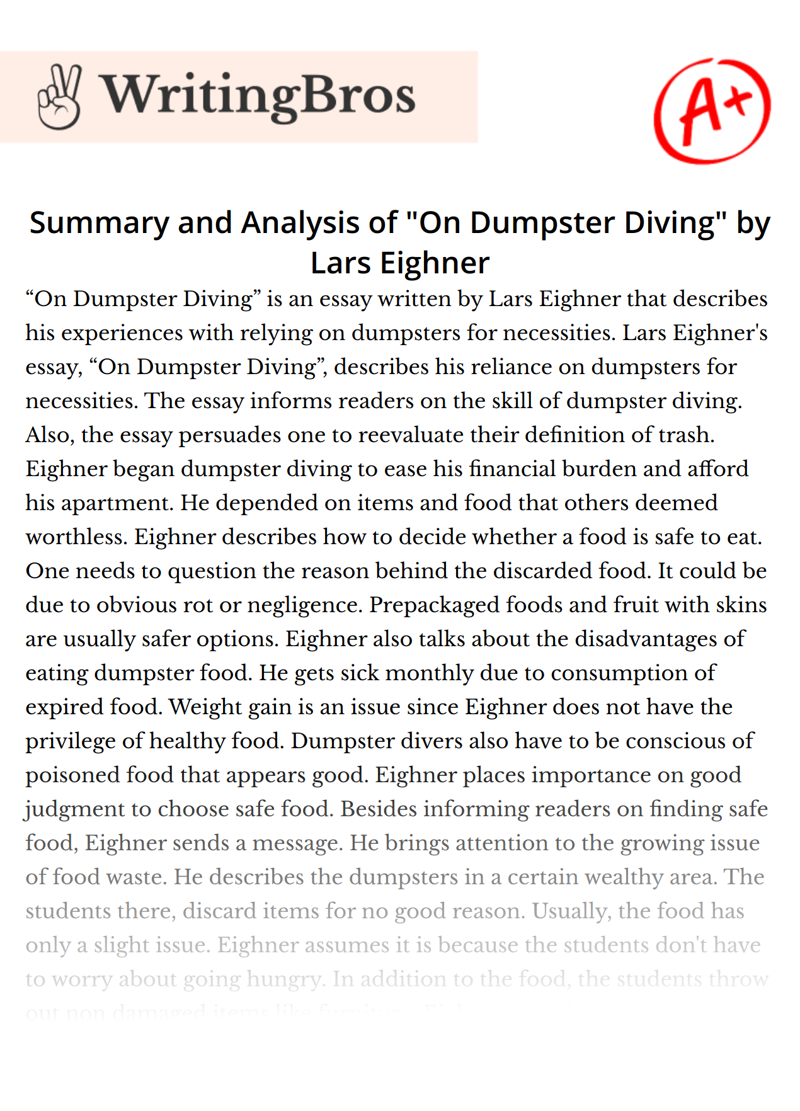Summary and Analysis of "On Dumpster Diving" by Lars Eighner

“On Dumpster Diving” is an essay written by Lars Eighner that describes his experiences with relying on dumpsters for necessities.
Lars Eighner's essay, “On Dumpster Diving”, describes his reliance on dumpsters for necessities. The essay informs readers on the skill of dumpster diving. Also, the essay persuades one to reevaluate their definition of trash.
Eighner began dumpster diving to ease his financial burden and afford his apartment. He depended on items and food that others deemed worthless. Eighner describes how to decide whether a food is safe to eat. One needs to question the reason behind the discarded food. It could be due to obvious rot or negligence. Prepackaged foods and fruit with skins are usually safer options. Eighner also talks about the disadvantages of eating dumpster food. He gets sick monthly due to consumption of expired food. Weight gain is an issue since Eighner does not have the privilege of healthy food. Dumpster divers also have to be conscious of poisoned food that appears good. Eighner places importance on good judgment to choose safe food. Besides informing readers on finding safe food, Eighner sends a message. He brings attention to the growing issue of food waste. He describes the dumpsters in a certain wealthy area. The students there, discard items for no good reason. Usually, the food has only a slight issue. Eighner assumes it is because the students don't have to worry about going hungry. In addition to the food, the students throw out non damaged items like furniture. Eighner uses these examples to persuade readers to be more conscious of what they throw out. One could reuse or repurpose unwanted items instead of simply discarding them.
Eighner describes the mental phases one goes through when they begin dumpter diving. At first, the person feels shame for having to resort to picking through trash. They tend to hide from the public to avoid harsh judgement. Then, the appreciation for the dumpster comes. The person realizes how much of the trash is actually useful and in good condition. The next phase is critical because the person must decide what type of diver they will be. If the diver is still influenced by consumerism they will attach themselves to each item. Every shiny thing will become apart of them unless they discipline themselves. Eighner instead chooses to only take things he needs for his survival. He is mindful in the stuff he brings into his life so it does not become overwhelming.
Eighner can learn about an individual and society their discarded items. The dumpsters tend to be full of sad content such as old memories and dead pets. These dumpsters contain memories and sensitive information. Eighner refuses to make harsh assumptions about someone based on their trash. He finds it amusing how much he can learn about someone from their trash. Eighner ends his essay on the problems with materialism. He explains that there are too many dumpsters full of useable items. He argues the importance of only keeping items one values. Eighner pitys those that continue to accumulate possessions just to compete with others. He sends the readers off with a final message of learning to value ideas over material items.
References
- Eighner, L. (1993). On Dumpster Diving. The Threepenny Review, 48, 6-8. https://www.jstor.org/stable/4381046
- Gale, C. (2014). The Art of Scavenging: Eighner’s “On Dumpster Diving” and Ehrenreich’s Nickel and Dimed as Exemplary Models for Teaching Cultural Studies. Cultural Studies ↔ Critical Methodologies, 14(3), 283–293. https://doi.org/10.1177/1532708614536485
- Johnston, S. (2017). “Dumpster Diving” as a Tool for Environmental Education: A Qualitative Study of an Ecosophic Educational Intervention. Journal of Environmental Education, 48(2), 80–90. https://doi.org/10.1080/00958964.2016.1264857
- McIntyre, M. E., & Fishwick, P. A. (2019). Using “On Dumpster Diving” to Promote Environmentalism and the Cultural Value of “Waste”. Journal of Arts and Humanities, 8(9), 17–28. https://doi.org/10.18533/journal.v8i9.1674
- Wilk, R. R. (2006). Scraping the Surface: The Cultural Politics of Dumpster Diving. Journal of Material Culture, 11(1–2), 221–246. https://doi.org/10.1177/1359183506063016
Cite this Essay
To export a reference to this article please select a referencing style below

